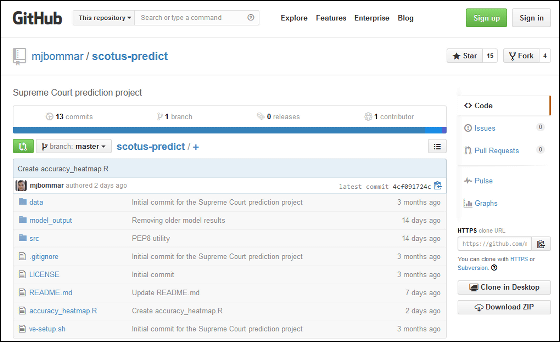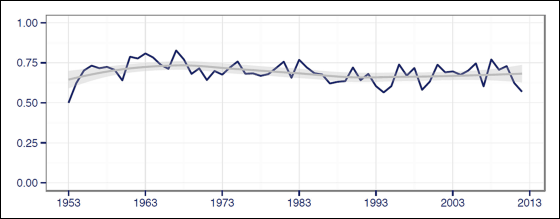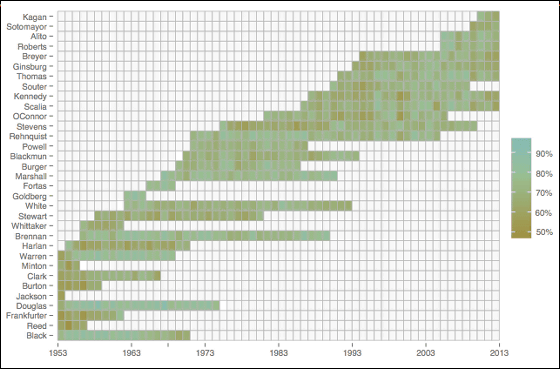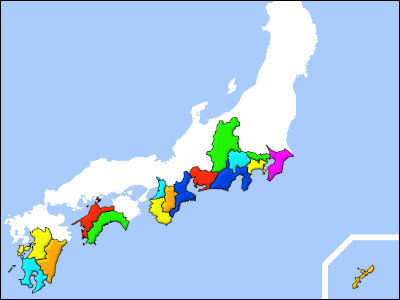Algorithms will be developed that can predict with high accuracy whether the Supreme Court will support or reverse the lower court

In many countries including JapanTriennial systemIs adopted, and the decision of the lower court decision ultimately has the authority to decide by the Supreme Court. For this reason, the Supreme Court ruled that not only the litigants but also a lot of stakeholders gathered attention, but the development of an algorithm that can predict whether the Supreme Court supports the judgment of the lower court decision with high probability It is.
The Next Evolution of SCOTUS Predictions: Predicting 7,000 Cases Over 60 Years with 71% Accuracy | Josh Blackman's Blog
http://joshblackman.com/blog/2014/07/29/the-next-evolution-of-scotus-predictions-predicting-7000-cases-over-60-years-with-71-accuracy/
In the United States, you choose a player who likes Major League Baseball (MLB), make a fictitious team, point to the results of the selected players and compete for that scoreFantasy Sport(Fantasy sports) "are thriving, competitions competing online are held, many fans compete for their discrimination everyday. In addition, the horse which once became a boom in JapanPaper owner gameEtc is also a kind of fantasy sports.
While fantasy sports based on MLB and NFL etc. became popular and many sites managed to compete against opponents worldwide online, "Fantasy SCOTUS"Is known for having strong fans at a different color site that makes the result of the United States Supreme Court ruled out as a neta of fantasy sports.
Mr. Josh Blackman who operates that FantasySCOTUS has announced that he succeeded in developing an algorithm capable of predicting the judgment of the Supreme Court Judge issued in the past 60 years with high accuracy of 71% on his own blog I will.
This algorithm developed by Mr. Blackman in collaboration with Mr. Daniel Martin Katz and Mr. Michael J. Bomarrito produces a lot of options (decision trees) and takes a majority vote "Random Forest"We adopt an algorithm called" Extremely Randomized Trees "which is a type of machine learning algorithm called" Extremely Randomized Trees ". The source code of this algorithm ishereIt is open to the public.
Mjbommar / scotus-predict · GitHub
https://github.com/mjbommar/scotus-predict

This algorithm is based on the analysis of the results of 2623 Supreme Court precedents since 1953, by analyzing the judgment of the Supreme Court judgment, by analyzing voting data of lower courts, judges' judges and judges before the judgment We predicted that the content of the judgment was 69.7%, and that of each Supreme Court judge was 70.9% successfully.
This is a graph showing the predictive predictive value about the content of judgment for each year. Although there are some variations from year to year, we maintain a predictive value of around 70%.

Also, this graph shows the predictive predictive rate for each Supreme Court judge in a heat map format. The closer the dot is to green, the higher the accuracy rate is. According to Mr. Blackman, Judge Harlan, Judge Frankfurter, Judge Burton are comparatively difficult to predict.

Mr. Blackman who developed an algorithm that can predict past actions of the Supreme Court justice with high accuracy naturally said that he has a strong interest in predicting the Supreme Court decision to be given to the future in the future Thing. Therefore, Mr. Blackman is holding his own championship tournament (tournament) by an algorithm predicting the judgment result of the Supreme Court soon in the blog of his own, and is pending acclaim for the challenger to the algorithm created by himself .
Related Posts:







